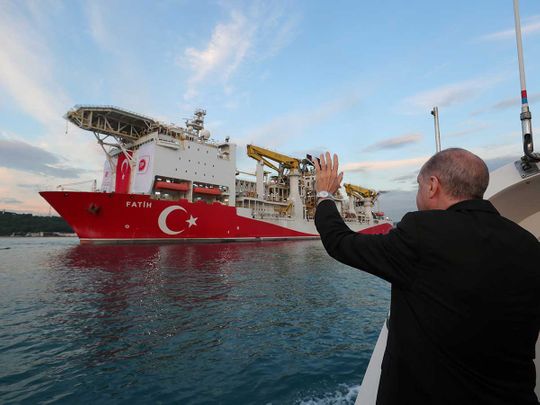
As I followed the news in the past few days of the Turkish discovery of large natural gas reserves off the Black Sea coast, and the lifting of the United Nations sanctions against Iran, I could not help wonder what it means for their people.
On Friday, Turkish President Recep Tayyip Erdogan announced the discovery of 320 billion cubic metres of natural gas reserves. For days, he was promising “massive news” that, he said, would usher in a “new Turkey,” which is dependent on costly energy imports. He said the news would also ease the financial crisis which saw the national currency, the lira, plunge to record lows recently.
A few days before that, the UN Security Council rejected a United States proposal to extend the arms embargo on Iran, which expires in October. Under the nuclear deal, which Iran signed with the P5+1 group of powers — the US, China, France, Russia, the UK and Germany, in 2015, Tehran would get sanctions relief in return for limits on its sensitive nuclear activities and allow international inspections.
These should be good news for the people of Turkey and Iran. It would give them some relief amid the worst economic conditions both the countries have seen for decades. But I don’t think the Turks or the Iranians really care. Both governments have been squandering the national wealth, spending on everything except for the prosperity of their poverty-stricken countries. On the other hand, these developments could very well be bad news for the region.
Turkey’s slowing economy
First, let’s check the numbers. Turkey has, for the past three years, been spending more than it has. Like other populist leaders, Erdogan has been burning the country’s cash reserve in a desperate attempt to conceal the pathetic state of the economy.
Amid growing national debt and the fallout of coronavirus, the Turkish economy is expected to contract by 5 per cent. Erdogan, who is known to have a distaste for numbers, have been ignoring the repeated warning by international financial organisations that all economic indicators point to an unprecedented crisis.
Erdogan is expected to channel his country’s new-found wealth towards funding his audacious military adventures in the Middle East.
Four years ago, the US dollar was trading at 2.95 Turkish liras. The dollar is now worth 7.33 liras. The currency has fallen by 19 per cent against the dollar this year, making Turkey one of the worst performers in the emerging markets. The Erdogan solution: “If they have their dollars, we have our God!” he famously told the people in 2018.
Meanwhile, last week’s UN decision will allow Iran to buy and sell conventional arms, which would supposedly give it’s economy some much-needed relief. Inflation has reached a staggering 22 per cent this year compared to last year. The currency continues to lose value. Since March, Iran’s rial fell by nearly 70 per cent and reached 260,000 against the dollar. Three years ago, before the US pulled out of the nuclear deal and reinstated sanctions and applied its ‘maximum pressure’ policy, the rial traded at 32,000 to the dollar.
Why Iranians are disenchanted
Iranians have taken to the streets twice in the past five years to protest the worsening economic conditions, rising inflation and unemployment. Both uprisings were met with violent crackdowns by the regime’s security forces and paramilitary militias loyal to the supreme leader.
In theory, Turkey’s new gas discovery and the sanctions relief Iran should benefit their peoples. The region’s recent history, however, offers ample evidence to the contrary. These developments will not, in any way, lead to the repair of the collapsing economy in the two countries. And they also spell further trouble for the region.
The [Iranian] regime has spent a large part of Iran’s oil revenues to recruit, train and arm proxy militias in several Arab countries.
Erdogan is expected to channel his country’s new-found wealth, if the news proves credible, towards funding his audacious military adventures in the Middle East. For the megalomaniac Erdogan, expanding Turkish influence in the region to realise his dream of restoring the past glory of the Ottoman state seems to be the priority.
His consolidation of power in Turkey by jailing and ousting his rivals, tampering with the constitution to give himself absolute powers and his aggressive behaviour with Turkey’s immediate neighbours, such as Greece, Syria and Iraq, is aimed at realising his imperial designs. It also explains his bizarre intervention in Libya. The economy and the prosperity of the Turks is way down in his to-do list.
Iran cannot be expected to do better either. The regime, for the past 40 years, has been using the country’s vast wealth (the third-largest oil producer in Opec) on its imperial project. Iranian leaders aspire to restore the past glory of the Persian empire. This project has cost the region millions of lives and plunged it in endless conflict.
The regime has spent a large part of Iran’s oil revenues to recruit, train and arm proxy militias in several Arab countries: From Hezbollah in Lebanon to the different Hashd militias in Iraq, to the Al Houthi rebels in Yemen. Iran also has several militias fighting on its behalf in Syria. And that all happened while Iran was under an international arms embargo. Just imagine what the regime in Tehran will do now after the sanctions are lifted!
It must be hard for the Turkish and Iranian peoples to see their wealth wasted while their neighbours are busy building their countries and coming up with 10- and 20-year development plans. But the responsibility rests with the people of Turkey and Iran to change the course of their destiny.







